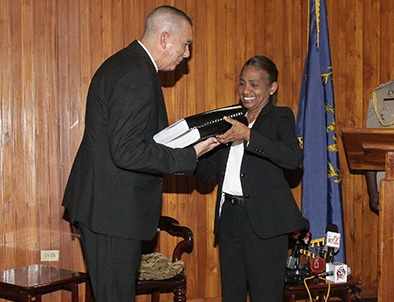(Trinidad Guardian) Deficiency in the Central Bank’s regulatory control of the insurance industry and the respective “visions” of CL Financial chairman Lawrence Duprey and Hindu Credit Union chairman Harry Harnarine have come in for criticism by chairman of the Clico/HCU commission of enquiry, Sir Anthony Colman.
Colman, sole commissioner of the enquiry, delivered the remarks in a statement reflecting on his final report on the five-year task of the enquiry.
The report—two hefty volumes— was presented yesterday by commission secretary Judith Gonzales to President Anthony Carmona at President’s House, St Ann’s. Carmona subsequently sent it to Prime Minister Dr Keith Rowley around 1 pm.
Colman, via a statement, regretted that for medical reasons he was unable to travel to T&T to present it.
Colman was commissioned under the past People’s Partnership cabinet in November 2010 to probe and ascertain the reasons for the failure of CL Financial, CL Investment Bank, British American (T’dad) Ltd, Caribbean Money Market Brokers Ltd (CMMB) and the Hindu Credit Union Co-operative Society Ltd. Recommendations were also sought.
Proceedings began in March 2011 ending in May 2013. It involved five million pages of documents and 77 lawyers. CL Financial Chief Duprey didn’t appear. Overall cost, including Colman’s $7 million fee, was estimated in 2013 as $36.2 million.
In yesterday’s statement, read by Gonzales, Colman referred to the captains of Clico and HCU in seeking to identify the one characteristic which linked the collapse of HCU with that of Clico and its associated companies.
Colman said: “It was repeatedly claimed that the one motive that drove both Harry Harnarine and Lawrence Duprey to ever bigger deals was ‘vision.’ Yet, in spite of all the warnings received from the Central Bank and the auditors they went on, like Icarus, only to be destroyed by the sun of their own vision.”
He said it was not the appropriate time to comment on the report’s findings with regard to responsibility for the CLF Group collapse, or on the mechanism of failure which caused the government to intervene in such large measure. However, he said there were two matters which needed immediate legislative action.
“Firstly, the powers of regulatory control of the insurance industry by the Central Bank are found to be fundamentally deficient.
“That deficiency was starkly shown up by the autocratic style of management of Clico and the CLF Group, generally by its business model, which is found to be seriously flawed and by the cavalier manner in which it treated attempts by the Inspector of financial institutions to deploy such limited regulatory control tools as were then available and ignored to a large extent the recommendations as to management of PricewaterhouseCoopers (PWC), the corporate auditors of the CLF Group and of Clico.”

He added: “The problem lies with the inadequate regulatory scope of the Insurance Act which in recent years has not received substantive amendment to the regulatory powers of the Central Bank.”
Colman said his report noted that although in the aftermath of the CLF collapse “an impressive Insurance Bill” was tabled in Parliament by the previous administration, the bill has never been enacted.
The bill sought to introduce a regulatory regime for the insurance industry, aimed at making the management and financial control of insurance companies more robust and less vulnerable to internal misuse and to outside financial crises conditions.
“Although its provisions have been strongly influenced by the experience of the Clico disaster, had at least some of the regulatory powers been enacted by 2008, the collapse of the CLF Group might have been avoided,” he said.
Secondly, Colman said the Commissions of Enquiry Act had been shown to be seriously deficient in one particularly important respect: Compelling witnesses to attend enquiries to give evidence.
He said although a commissioner was empowered as a High Court judge to order a witness to appear to give evidence, failure to comply did not amount to an offence analogous to contempt of court which could be punished by a judge.
“Instead, the available sanction for breach of such an order involves prosecution in a magistrates court by the Director of Public Prosecutions or, if the commissioner so orders, by the secretary to the commission. Maximum sentence upon conviction is a fine of TT$2,000, a punishment of practically no deterrent effect.
Why so long
Colman also admitted the enquiry into the Clico companies did not provide an answer to all the questions raised in part of his terms of reference.
“To deal fully and sufficiently with those questions the commission would have had to investigate and review a mass of evidence requiring complex accounting analysis, together with political decisions made after the key events which this enquiry has been concerned to investigate.
“In order to minimise the delay in finalisation of the report, the commission has adopted a cutoff date in June 2009, when the Shareholders’ Agreement was entered into.”
“This commission had to accommodate not one enquiry but two (HCU, Clico)… the problem for investors, depositors and policy holders has been that the joining together of both enquiries has seriously prolonged completion of the reports on both.
He said one feature which significantly prolonged the time taken to finalise the Clico Report was the issuing of “Salmon letters” to those vulnerable to adverse criticism in the report.
